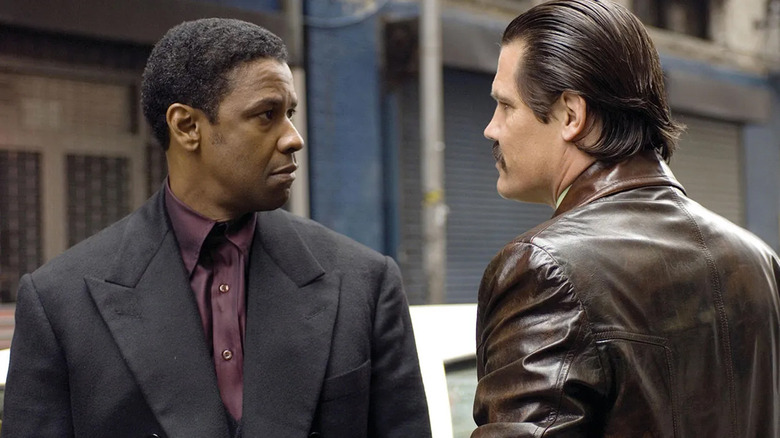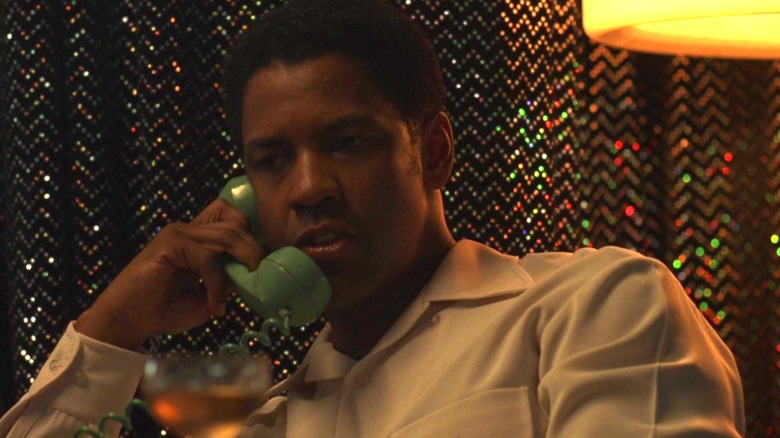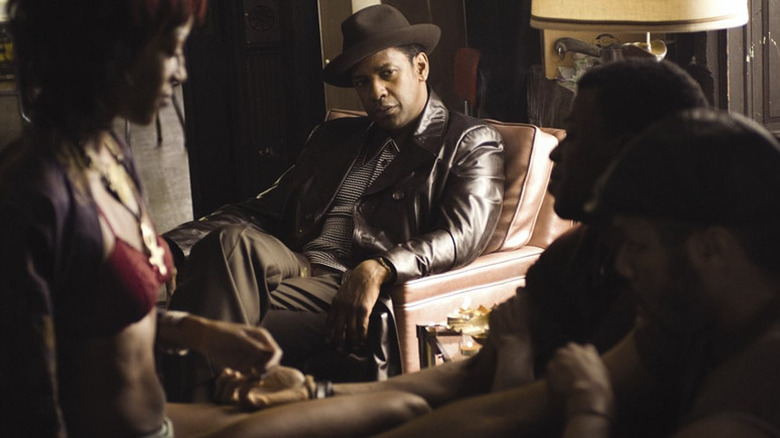The Denzel Washington Crime Thriller That Influenced One Of Jay-Z's Best Albums
If you like to keep up with the infinitely fascinating phenomenon of old shows and movies becoming popular on streaming, you may have noticed the Netflix resurgence of a 2007 Denzel Washington crime thriller. That crime thriller was "American Gangster," which saw Denzel portray Harlem drug kingpin Frank Lucas. An epic chronicle of the enterprising New Yorker's rise to power in the 1970s, and his subsequent fall from ... whatever the opposite of "grace" is, the 157-minute film was directed by the great Ridley Scott and also starred Russell Crowe as NYPD officer Richie Roberts, who ultimately takes down Lucas' sprawling operation.
What made "American Gangster" interesting within the context of gangster films was the protagonist himself, who wasn't your typical Italian mobster but a Black drug lord who bought heroin from Southeast Asia and smuggled it directly to Harlem, claiming to have used the coffins of dead American soldiers to do so. The film fictionalized aspects of Lucas' life, but it seems that pumping drugs into Manhattan by way of dead servicemen's coffins was enough to rouse none other than Jay-Z, who wrote an entire album inspired by the film.
Yes, believe it or not, there was a time when Jay-Z was known less for being Beyonce's very rich husband and more for rapping about his years spent hustling in Brooklyn's Marcy Houses, aka the Marcy Projects. For those film fans who remember when "American Gangster" was released, there might be a hint of the Mandela effect at play here, as many of us remember Jay-Z doing the soundtrack to Scott's movie. But this wasn't the case. The film had its own soundtrack, full of 1970s-era soul from the likes of Bobby Womack and Sam & Dave. Jay-Z's album, on the other hand, was very much his own project, and remarkably, lifted the rapper out of a late career slump.
Jay-Z was inspired by American Gangster
According to The New York Times, Denzel Washington really wanted Jay-Z to handle the soundtrack for "American Gangster." However, producer Brian Grazer reportedly "didn't think there'd be enough for Jay-Z to do," and Ridley Scott was keen to give the film an "authentic 1970s feel." Scott is one of Hollywood's most beloved grumps, and has somehow managed to become one of the most successful and revered directors in the industry by never holding back from expressing his honest opinion, such as when he talked about being "pissed" that he wasn't asked to direct the sequel to "Alien" or chastised the entire millennial generation for his movie "The Last Duel" disappointing at the box office.
You can imagine that our favorite curmudgeon would have been incensed by the idea of a rapper doing the soundtrack to his gritty 1970s-set crime thriller, which meant Jay-Z was left to simply watch "American Gangster" and come up with his own concept album inspired by the events therein. Hence, the 2007 album of the same name, which was Jay-Z's attempt to fill in the gaps from Scott's movie. As the rapper told The NY Times, "It was like I was watching the film, and putting it on pause, and giving a back story to the story." He added that the film "immediately clicked" with him, and likened it to "Scarface" in the sense that it's "an inspiring film." While that might seem like an odd admission given the film is about a power-hungry drug dealer who sacrifices everything in pursuit of criminal supremacy only to become a snitch, for Jay-Z it seems the way in which Lucas "carried himself" and "went about things" was the inspiring part.
Thankfully, that inspiration actually made for a half decent album for the rap megastar, with "American Gangster" representing a marked improvement over the previous year's "Kingdom Come," which hadn't been all that well-received.
The legacy of American Gangster
In a 2007 interview, Jay-Z, then the president of Def Jam records, went into more detail about how he crafted his album based on Ridley Scott's gangster flick. The rapper explained how "there's so many different emotions [...] left untold because you have to fit this into a format," using the example of a scene where Frank Lucas' nephew, Stevie (Tip "T.I." Harris) gives up on his dream of becoming a baseball player after being subsumed by Frank's drug operation. As Jay-Z explained:
"That emotion that we never got to see, Denzel go[ing] to his room and cry[ing], or at least be[ing] reflective about it. Because [...] he didn't want his nephew following him into that type of life, so those are things that I would take, I would press pause on them, and then I would explain the emotions behind [it]."
According to the rapper, the movie had a powerful effect on him, taking him "back to a place that [he] hadn't been for a minute." He continued, "It just sparked all these ideas and all these thoughts and all these emotions."
That inspiration seems to have paid off. 2006's "Kingdom Come" had been met with disappointment from critics, with Pitchfork's Peter Macia writing that the album is characterized by "rampant mediocrity" and amounts to "Jay boringly rapping about boring stuff and being totally comfortable with it." If, like me, you grew up with Jay-Z as a pop culture mainstay, you might recall 2001's "The Blueprint" being the rapper's actual last good album, other than, perhaps, 2003's "The Black Album." 2002's "The Blueprint 2: The Gift & The Curse" and 2006's "Kingdom Come" just didn't live up to the standards of vintage Jay-Z. Who'd have thought that Ridley Scott would help bring Jay out of his slump?
"American Gangster" might not be frequently cited as one of the best mob movies ever made, and it certainly doesn't quite hit "The Godfather" or "Goodfellas" heights. But the critical response was, on the whole, good, and "American Gangster" remains one of Scott's best efforts. Add to that the fact that it prompted Jay-Z to make a decent album, and that's a pretty solid legacy.


